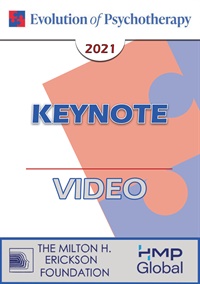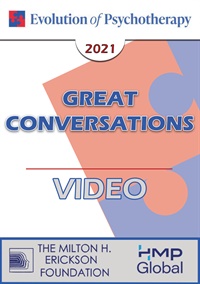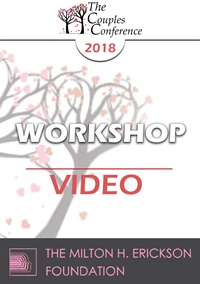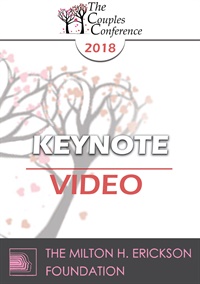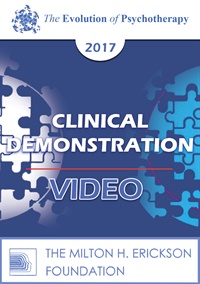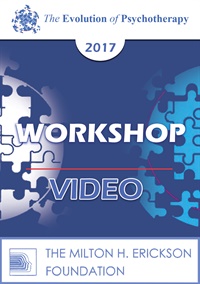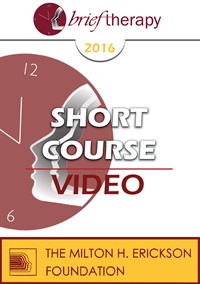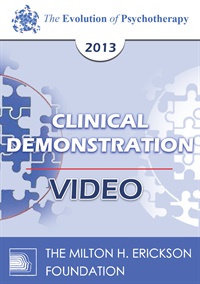- Average Rating:
- Not yet rated
- Topic Areas:
- Addiction | Attachment | Couples Therapy | Keynotes | Love | Relationships
- Categories:
- Evolution of Psychotherapy | Evolution of Psychotherapy 2021
- Faculty:
- Helen E. Fisher, PhD
- Course Levels:
- Master Degree or Higher in Health-Related Field
- Duration:
- 1 hour
- Format:
- Audio and Video
- Original Program Date:
- Dec 03, 2021
- Short Description:
- Is technology changing love? Why do you fall in love with one person rather than another? Why is the rejected brain primed for psychotherapy? How can you use neuroscience to keep love alive? And where are we headed in our digital age? Anthropologist and neuroscientist Dr. Helen Fisher uses her brain scanning work (fMRI) to discuss three basic brain systems that evolved for mating and reproduction--the sex drive, romantic love, and attachment; each plays a pivotal role in human health and happiness. And she uses her data on 50,000 single Americans to explain a new (and positive) trend in courtship, what she calls “slow love.” She then discusses her data on the biological foundations of human personality—specifically four basic styles of thinking and behaving that impact love relationships and all other social interactions.
- Price:
- $59.00 - Base Price
- Average Rating:
- Not yet rated
- Topic Areas:
- Addiction | Great Conversations
- Categories:
- Evolution of Psychotherapy | Evolution of Psychotherapy 2021
- Faculty:
- Jeffrey Zeig, PhD | Gabor Maté
- Course Levels:
- Master Degree or Higher in Health-Related Field
- Duration:
- 1 hour
- Format:
- Audio and Video
- Original Program Date:
- Dec 01, 2021
- Short Description:
- Great Conversation on the topic of Addiction from the 2021 Evolution of Psychotherapy Conference. Featuring Jeffrey Zeig and Gabor Maté.
- Price:
- $59.00 - Base Price

- Average Rating:
- Not yet rated
- Topic Areas:
- Ericksonian Hypnosis and Therapy Techniques | Milton Erickson | Addiction | Habits | Tailoring | Hypnosis
- Categories:
- Erickson Streaming Video Collection | Erickson Materials | Milton H. Erickson Collections
- Faculty:
- Jeffrey Zeig, PhD | Milton H. Erickson, MD
- Course Levels:
- Master Degree or Higher in Health-Related Field
- Duration:
- 1h 14m
- Format:
- Audio and Video
- Original Program Date:
- May 07, 2021
- Short Description:
- A client asks Erickson to help him stop smoking tobacco. Rather than using a formula, Erickson tailors a treatment approach to both address underlying problems and elicit resources.
- Price:
- $39.95 - Base Price
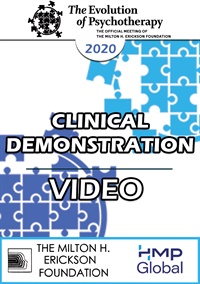
EP20 Clinical Demonstration 11 - Learn to Read Brain Scans: 50 Scans in 60 Minutes - Daniel Amen, MD
- Average Rating:
- Not yet rated
- Topic Areas:
- Neuroscience | Clinical Demonstrations | Psychotherapy
- Categories:
- Evolution of Psychotherapy | Evolution of Psychotherapy 2020
- Faculty:
- Daniel Amen, MD
- Course Levels:
- Master Degree or Higher in Health-Related Field
- Duration:
- 1 hour
- Format:
- Audio and Video
- Original Program Date:
- Dec 13, 2020
- Short Description:
- This engaging session offers a fast-paced tour through fifty brain scans that reveal how imaging transforms mental health practice. Participants learn to recognize patterns linked to trauma, addiction, mood disorders, and toxicity, and discover how SPECT imaging helps differentiate biological from psychological causes. The session provides practical insight into using brain-based evidence to guide treatment, reduce stigma, and inspire hope for healing.
- Price:
-
Sale is $29.00
price reduced from Base Price - $59.00

- Average Rating:
- Not yet rated
- Topic Areas:
- Workshops | Eating Disorders | Ericksonian Hypnosis and Therapy Techniques | Addiction | Hypnosis
- Categories:
- Erickson Congress | Erickson Congress 2019
- Faculty:
- Albina Tamalonis, PsyD
- Duration:
- 1 Hour 57 Minutes
- Format:
- Audio Only
- Original Program Date:
- Dec 15, 2019
- Short Description:
- During the first hour of this workshop the specific treatment ideas targeting Eating Disorders will be presented. Also, the workshop will delineate how an eating disorder is an addiction and present the underlying issues, which need to be addressed because of an addiction’s multi-dimensional infiltration. The remaining hour will be a demonstration of Ericksonian Hypnosis on a volunteer who wants to lose or gain any amount of weight. You will see: a Ericksonian diagnostic interview which focuses on the present where the solutions can be found; an Ericksonian induction using conscious/unconscious dissociation; a Ericksonian suggestion phase tailored to fit the patient; and a reorientation out of trance. There will be some time for questions and discussion.
- Price:
- $15.00 - Base Price
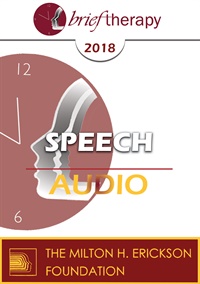
- Average Rating:
- Not yet rated
- Topic Areas:
- Speeches | Trauma
- Categories:
- Brief Therapy Conference | Brief Therapy Conference 2018 | Pioneers in Couples and Family Therapy
- Faculty:
- Janina Fisher, PhD
- Duration:
- 1:05:26
- Format:
- Audio Only
- Original Program Date:
- Dec 09, 2018
- Short Description:
- Janina Fisher explores how traumatic memories continue to impact individuals through persistent symptoms like depression and anxiety. She introduces the concept of implicit memory, explaining how emotional and visceral memories shape current behavior. Fisher offers practical techniques for helping clients understand their trauma responses, emphasizing a transformational approach that focuses on healing and creating new experiences rather than reliving past events.
- Price:
- $15.00 - Base Price
Credit available - Click Here for more information
- Average Rating:
- Not yet rated
- Topic Areas:
- Addiction | Couples Therapy | Workshops | Continuing Education | Love | Neurobiology | Neuroscience
- Categories:
- Couples Conference | Couples Conference 2018 | Online Continuing Education
- Faculty:
- Helen E. Fisher, PhD
- Course Levels:
- Master Degree or Higher in Health-Related Field
- Duration:
- 1:57:48
- Format:
- Audio and Video
- Original Program Date:
- May 04, 2018
- Short Description:
- Biological Anthropologist Helen Fisher discusses four broad basic styles of thinking and behaving associated with four primary brain systems: the dopamine, serotonin, and testosterone and estrogen/oxytocin systems. She discusses why people are predisposed to love one person rather than another (mate choice). She hypothesizes that individuals who primarily express of the constellation of traits linked with each of these brain systems may be predisposed to different forms of love addiction, includ
- Price:
-
Sale is $29.00
price reduced from Base Price - $59.00
Credit available - Click Here for more information
- Average Rating:
- Not yet rated
- Topic Areas:
- Addiction | Keynotes | Continuing Education | Love | Couples Therapy | Neuroscience | Sex and Sexuality
- Categories:
- Couples Conference | Couples Conference 2018 | Online Continuing Education
- Faculty:
- Helen E. Fisher, PhD
- Course Levels:
- Master Degree or Higher in Health-Related Field
- Duration:
- 57:05
- Format:
- Audio and Video
- Original Program Date:
- May 04, 2018
- Short Description:
- Biological anthropologist Helen Fisher discusses three brain systems that evolved for mating and reproduction: the sex drive; feelings of intense romantic love; and feelings of deep attachment to a long term partner. She then focuses on her brain scanning research (using fMRI) on romantic rejection and the trajectory of love addiction following rejection. She concludes with discussion of the brain circuits associated with long-term partnership happiness and the future of relationships in the dig
- Price:
-
Sale is $29.00
price reduced from Base Price - $59.00
EP17 Clinical Demonstration 10 - Learn to Read Brain Scans: 50 cases in 60 Minutes - Daniel Amen, MD
Credit available - Click Here for more information
- Average Rating:
- Not yet rated
- Topic Areas:
- Clinical Demonstrations | Neuroscience | Psychotherapy
- Categories:
- Evolution of Psychotherapy | Evolution of Psychotherapy 2017 | Online Continuing Education
- Faculty:
- Daniel Amen, MD
- Course Levels:
- Master Degree or Higher in Health-Related Field
- Duration:
- 58:58
- Format:
- Audio and Video
- Original Program Date:
- Dec 15, 2017
- Short Description:
- This clinical demonstration offers a rapid tour through fifty brain scans that reveal the links between brain function, behavior, and mental health. Participants learn how imaging can uncover hidden causes of emotional and relational problems—from trauma and toxins to sleep issues and head injuries—and how targeted interventions can restore balance. The session inspires a new way of thinking about psychotherapy, showing that healing the brain transforms lives.
- Price:
-
Sale is $29.00
price reduced from Base Price - $59.00
Credit available - Click Here for more information
- Average Rating:
- Not yet rated
- Topic Areas:
- Workshops | Post-Traumatic Stress Disorder (PTSD) | Trauma | Storytelling | Constructive Narrative | Addiction | Abuse | Borderline | Psychotherapy
- Bundle(s):
- Learning Track - EP17 Trauma Stream
- Categories:
- Evolution of Psychotherapy | Evolution of Psychotherapy 2017 | Evolution of Psychotherapy Trauma Learning Track | Online Continuing Education
- Faculty:
- Donald Meichenbaum, PhD
- Course Levels:
- Master Degree or Higher in Health-Related Field
- Duration:
- 2:48:12
- Format:
- Audio and Video
- Original Program Date:
- Dec 13, 2017
- Short Description:
- Ways to implement the core tasks of psychotherapy with patients who evidence PTSD and co-morbid disorders of prolong and complicated grief, Substance Abuse Disorders and Borderline Personality Disorders. A case conceptualization model of risk and protective factors and incorporates a constructive narrator perspective will be presented.
- Price:
-
Sale is $29.00
price reduced from Base Price - $59.00

- Average Rating:
- Not yet rated
- Topic Areas:
- Addiction | Couples Therapy | Workshops
- Categories:
- Couples Conference | Couples Conference 2017
- Faculty:
- Sue Diamond, MA, RCC
- Duration:
- 1:57:23
- Format:
- Audio Only
- Original Program Date:
- Apr 02, 2017
- Short Description:
- CC17 Workshop 12 - The Sober Truth: Doing Effective Couples Therapy with Addicted Partners - Sue Diamond Potts, MA, RCC Addiction is rampant in our society. Many of us have been both bombarded professionally with this reality and touched personally in some form. Addicts are like tornadoes ravaging their way through the lives of others, and people in need of immediate care are left bleeding on the sidelines. And yet,
- Price:
- $15.00 - Base Price
Tags: Addiction
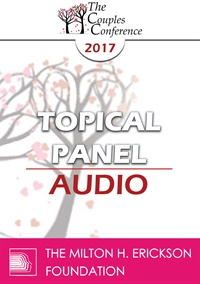
- Average Rating:
- Not yet rated
- Topic Areas:
- Couples Therapy | Topical Panels | Therapist Development | Clinical Psychology | Individual Therapy
- Categories:
- Couples Conference | Couples Conference 2017 | Pioneers in Couples and Family Therapy
- Faculty:
- Ellyn Bader, PhD | Sue Diamond, MA, RCC | Janis Abrahms Spring, PhD, ABPP
- Duration:
- 58:21
- Format:
- Audio Only
- Original Program Date:
- Apr 01, 2017
- Short Description:
- Couples treatment requires an understanding of interpersonal dynamics. Clinicians need to understand the benefits and liabilities of couples vs. individual therapy, and have a mechanism for deciding when to use each approach.
- Price:
- $15.00 - Base Price

- Average Rating:
- Not yet rated
- Topic Areas:
- Couples Therapy | Topical Panels | Therapist Development | Clinical Psychology | Individual Therapy
- Bundle(s):
- Learning Track - Couples Starter Kit
- Categories:
- Couples Conference | Couples Conference 2017 | Pioneers in Couples and Family Therapy
- Faculty:
- Janis Abrahms Spring, PhD, ABPP | Ellyn Bader, PhD | Sue Diamond, MA, RCC
- Course Levels:
- Master Degree or Higher in Health-Related Field
- Duration:
- 58:21
- Format:
- Audio and Video
- Original Program Date:
- Apr 01, 2017
- Short Description:
- Couples treatment requires an understanding of interpersonal dynamics. Clinicians need to understand the benefits and liabilities of couples vs. individual therapy, and have a mechanism for deciding when to use each approach.
- Price:
-
Sale is $29.00
price reduced from Base Price - $59.00

- Average Rating:
- Not yet rated
- Topic Areas:
- Infidelity | Topical Panels | Couples Therapy | Deception
- Categories:
- Couples Conference | Couples Conference 2017 | Pioneers in Couples and Family Therapy
- Faculty:
- Alexandra Katehakis, MA, MFT | Marty Klein, PhD | Stan Tatkin, PsyD, MFT
- Course Levels:
- Master Degree or Higher in Health-Related Field
- Duration:
- 56:45
- Format:
- Audio and Video
- Original Program Date:
- Mar 31, 2017
- Short Description:
- This panel explores infidelity as a multifaceted breach of trust, extending beyond sexual betrayal. Drawing from psychodynamic and neurobiological perspectives, the presenters examine deception, gaslighting, and confabulation. Clinical focus includes managing countertransference, maintaining therapeutic neutrality, and guiding partners through accountability, emotional repair, and post-crisis growth.
- Price:
-
Sale is $29.00
price reduced from Base Price - $59.00
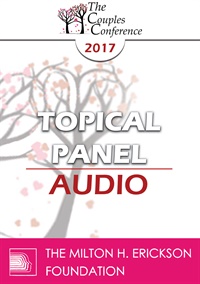
- Average Rating:
- Not yet rated
- Topic Areas:
- Infidelity | Topical Panels | Couples Therapy | Deception
- Categories:
- Couples Conference | Couples Conference 2017 | Pioneers in Couples and Family Therapy
- Faculty:
- Alexandra Katehakis, MA, MFT | Marty Klein, PhD | Stan Tatkin, PsyD, MFT
- Duration:
- 56:45
- Format:
- Audio Only
- Original Program Date:
- Mar 31, 2017
- Short Description:
- This panel explores infidelity as a multifaceted breach of trust, extending beyond sexual betrayal. Drawing from psychodynamic and neurobiological perspectives, the presenters examine deception, gaslighting, and confabulation. Clinical focus includes managing countertransference, maintaining therapeutic neutrality, and guiding partners through accountability, emotional repair, and post-crisis growth.
- Price:
- $15.00 - Base Price

- Average Rating:
- Not yet rated
- Topic Areas:
- Addiction | Workshops | Love | Relationships | Attachment | Couples Therapy | Sex and Sexuality | Attunement
- Categories:
- Couples Conference | Couples Conference 2017
- Faculty:
- Alexandra Katehakis, MA, MFT
- Duration:
- 1:57:10
- Format:
- Audio Only
- Original Program Date:
- Mar 31, 2017
- Short Description:
- Sex addiction destroys trust in relationships, traumatizing the partner, the sex addict, and the family system. Betrayal is an attachment injury that topples the regulatory systems of both parties, and when relational trauma is left untreated, both parties and the family system will suffer. Thus, when acute emotional and physical symptoms become chronic, treatment becomes more difficult making the prognosis for restoring the coupleship poor. Rapid intervention and interactive regulation between the couple is essential for relational healing to begin immediately. Attunement, communication, and empathy (ACE) are the three-pronged stool that supports the long, and sometimes arduous journey to restoring trust.
- Price:
- $15.00 - Base Price
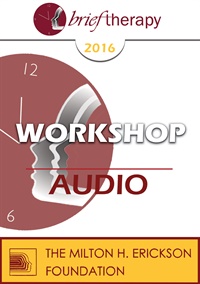
- Average Rating:
- Not yet rated
- Topic Areas:
- Psychotherapy | Workshops | Generative Psychotherapy | Addiction | Anxiety | Depression | Trauma
- Categories:
- Brief Therapy Conference | Brief Therapy Conference 2016
- Faculty:
- Stephen Gilligan, PhD
- Duration:
- 2:36:56
- Format:
- Audio Only
- Original Program Date:
- Dec 09, 2016
- Short Description:
- This workshop presents the Generative Psychotherapy approach to human states of suffering--depression, anxiety, trauma, addiction, etc. This practical and positive approach assumes that each core human experience has equivalent potential to be positive or negative, depending on the human relationship to it; and thus focuses on how problems may be transformed to resources by skillful human connection.
- Price:
- $15.00 - Base Price
- Average Rating:
- Not yet rated
- Topic Areas:
- Addiction | Short Courses | Utilization | Mind-Body
- Categories:
- Brief Therapy Conference | Brief Therapy Conference 2016
- Faculty:
- Bart Walsh, MSW
- Course Levels:
- Master Degree or Higher in Health-Related Field
- Duration:
- 1:30:02
- Format:
- Audio and Video
- Original Program Date:
- Dec 08, 2016
- Short Description:
- This presentation poses a substance abuse treatment which acknowledges and accommodates the personal needs being addressed by substance use, bypasses perceived resistance and employs idiosyncratic psycho-biological learning to achieve a body-mind gestalt complementary to the client’s sobriety. Client self empowerment and relapse prevention are built into the intervention This method develops a safe framework for addressing any subsequent mental health themes directly or indirectly related to substance misuse. Ideomotor questioning is employed as a practical conduit to body-mind communication and function.
- Price:
- $0.00 - $29.00
- Average Rating:
- Not yet rated
- Topic Areas:
- Neuroscience | Addiction | Keynotes | Love | Couples Therapy
- Categories:
- Couples Conference | Couples Conference 2016
- Faculty:
- Helen E. Fisher, PhD
- Course Levels:
- Master Degree or Higher in Health-Related Field
- Duration:
- 01:55:21
- Format:
- Audio and Video
- Original Program Date:
- May 13, 2016
- Short Description:
- Biological anthropologist Helen Fisher discusses three brain systems that evolved for mating and reproduction: the sex drive; feelings of intense romantic love; and feelings of deep attachment to a long term partner. She then focuses on her brain scanning research (using fMRI) on romantic rejection and the trajectory of love addiction following rejection. She concludes with discussion of the brain circuits associated with long-term partnership happiness and the future of relationships in the digital age—what she calls “slow love.”
- Price:
-
Sale is $29.00
price reduced from Base Price - $59.00
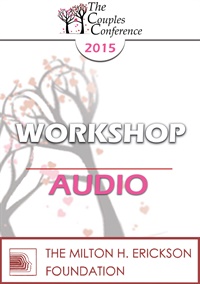
- Average Rating:
- Not yet rated
- Topic Areas:
- Addiction | Workshops | Love
- Categories:
- Couples Conference | Couples Conference 2015
- Faculty:
- Pat Love, EdD
- Duration:
- 1:46:03
- Format:
- Audio Only
- Original Program Date:
- Apr 26, 2015
- Short Description:
- This workshop will explore the fine line between love and addiction. Therapeutic strategies and questions will be explored, and you will learn three predictors of compulsion/ addiction.
- Price:
- $15.00 - Base Price
Tags: Addiction Love Couples Therapy
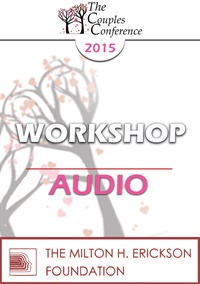
- Average Rating:
- Not yet rated
- Topic Areas:
- Couples Therapy | Workshops | Love | Relationships | Addiction | Sex and Sexuality | Trauma | Attunement | Communication
- Categories:
- Couples Conference | Couples Conference 2015
- Faculty:
- Alexandra Katehakis, MA, MFT
- Duration:
- 1:55:21
- Format:
- Audio Only
- Original Program Date:
- Apr 25, 2015
- Short Description:
- Sex addiction destroys trust in relationships, traumatizing the partner, the sex addict, and the family system. Relational trauma left untreated will have both parties and the entire system crumbling. Attunement, communication, and empathy (ACE) are the three pronged stool that supports the long, and sometimes arduous, journey to restoring trust. The goal is to recognize the signs of relational trauma in both parties, and compare the difference between relational trauma and co-dependence
- Price:
- $15.00 - Base Price
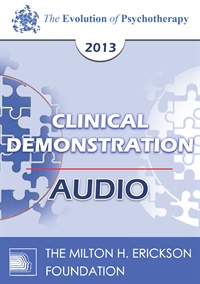
- Average Rating:
- Not yet rated
- Topic Areas:
- Clinical Demonstrations | Acceptance and Commitment Therapy (ACT) | Addiction | Depression | Psychotherapy
- Categories:
- Evolution of Psychotherapy | Evolution of Psychotherapy 2013
- Faculty:
- Steven Hayes, PhD
- Duration:
- 1 Hour
- Format:
- Audio Only
- Original Program Date:
- Dec 14, 2013
- Short Description:
- This case of complicated grieving in a young adult recovering from depression and a substance use disorder shows how perspective taking can be used to foster greater self-compassion in Acceptance and Commitment Therapy (ACT).
- Price:
- $15.00 - Base Price
- Average Rating:
- Not yet rated
- Topic Areas:
- Clinical Demonstrations | Addiction | Depression | Suicide | Storytelling | Constructive Narrative
- Categories:
- Evolution of Psychotherapy | Evolution of Psychotherapy 2013
- Faculty:
- Donald Meichenbaum, PhD
- Course Levels:
- Master Degree or Higher in Health-Related Field
- Duration:
- 1:00:02
- Format:
- Audio and Video
- Original Program Date:
- Dec 14, 2013
- Short Description:
- In this video presentation, Dr. Meichenbaum works with a young woman who is depressed and who has attempted suicide seven times. She has undergone multiple traumas in her life, including rape, suicide by her mother, substance abuse. The case illustrates ways to conduct risk assessment and how to use a constructive narrative treatment approach to identify and bolster the client’s strengths and resilience.
- Price:
-
Sale is $29.00
price reduced from Base Price - $59.00
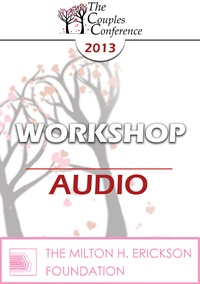
- Average Rating:
- Not yet rated
- Topic Areas:
- Depression | Workshops | Masculinity | Gender | Relational Life Therapy Model (RLT)
- Categories:
- Couples Conference | Couples Conference 2013 | Pioneers in Couples and Family Therapy
- Faculty:
- Terry Real, LICSW
- Duration:
- 1:25:11
- Format:
- Audio Only
- Original Program Date:
- Apr 19, 2013
- Short Description:
- This workshop addresses the often-overlooked crisis of male depression, affecting an estimated 11 million men. It examines how cultural stigma and rigid gender roles contribute to covert depression—masked by workaholism, substance use, withdrawal, and anger. The session introduces the concept of "compound depression," where men feel ashamed of their vulnerability. Strategies include therapy, medication, peer support, partner involvement, and building relational skills to break the silence and promote healing.
- Price:
- $15.00 - Base Price
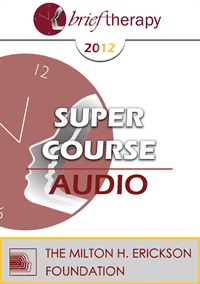
- Average Rating:
- Not yet rated
- Topic Areas:
- Attachment | Neuroscience | Super Courses | Intimacy | Differentiation | Couples Therapy
- Categories:
- Brief Therapy Conference | Brief Therapy Conference 2012 | Pioneers in Couples and Family Therapy
- Faculty:
- Ellyn Bader, PhD
- Duration:
- 1:51:57
- Format:
- Audio Only
- Original Program Date:
- Dec 09, 2012
- Short Description:
- Learn advanced techniques for understanding relationship dynamics, addressing communication challenges, and supporting couples through complex emotional landscapes. Explore attachment styles, therapeutic interventions, and strategies for helping couples navigate conflict, addiction, and personal growth.
- Price:
- $15.00 - Base Price


